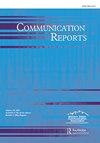关系湍流理论中的相互依赖与情感过程
IF 1.6
Q3 COMMUNICATION
引用次数: 3
摘要
在关系动荡理论(RTT)指导下的研究强调,负面情绪是导致干扰伴侣产生动荡的情感机制。然而,对RTT的情感机制进行更全面的研究应该研究干扰和促进如何通过强化的消极和积极情绪间接预测动荡。我们报告了349名个体的研究结果,他们共同检查了干扰和促进,以估计负面和正面情绪对湍流的间接影响。结果显示,干扰对湍流有积极的直接影响,通过消极和积极的情绪对湍流也有积极的间接影响。我们观察到,通过积极的情绪,促进对动荡的负面间接影响。对源自干扰和促进的RTT过程进行了对比,发现其强度相等。本文章由计算机程序翻译,如有差异,请以英文原文为准。
Interdependence and Affective Processes in Relational Turbulence Theory
Studies guided by relational turbulence theory (RTT) emphasize negative emotions as the affective mechanism responsible for turbulence arising from interfering partners. However, a more complete examination of RTT’s affective mechanisms should study how interference and facilitation indirectly predict turbulence through intensified negative and positive emotions. We report results from 349 individuals after examining interference and facilitation together to estimate indirect effects on turbulence through negative and positive emotions. Results revealed a positive direct effect of interference on turbulence, and a positive indirect effect of interference on turbulence through negative and positive emotions. We observed a negative indirect effect of facilitation on turbulence through positive emotions. RTT processes originating from interference and facilitation were contrasted and found to be equivalent in strength.
求助全文
通过发布文献求助,成功后即可免费获取论文全文。
去求助
来源期刊

Communication Reports
COMMUNICATION-
CiteScore
3.70
自引率
0.00%
发文量
18
期刊介绍:
Communication Reports (CR), published biannually since 1988, is one of two scholarly journals of the Western States Communication Association (WSCA). The journal publishes original manuscripts that are short, data/text-based, and related to the broadly defined field of human communication. The mission of the journal is to showcase exemplary scholarship without censorship based on topics, methods, or analytical tools. Articles that are purely speculative or theoretical, and not data analytic, are not appropriate for this journal. Authors are expected to devote a substantial portion of the manuscript to analyzing and reporting research data.
 求助内容:
求助内容: 应助结果提醒方式:
应助结果提醒方式:


